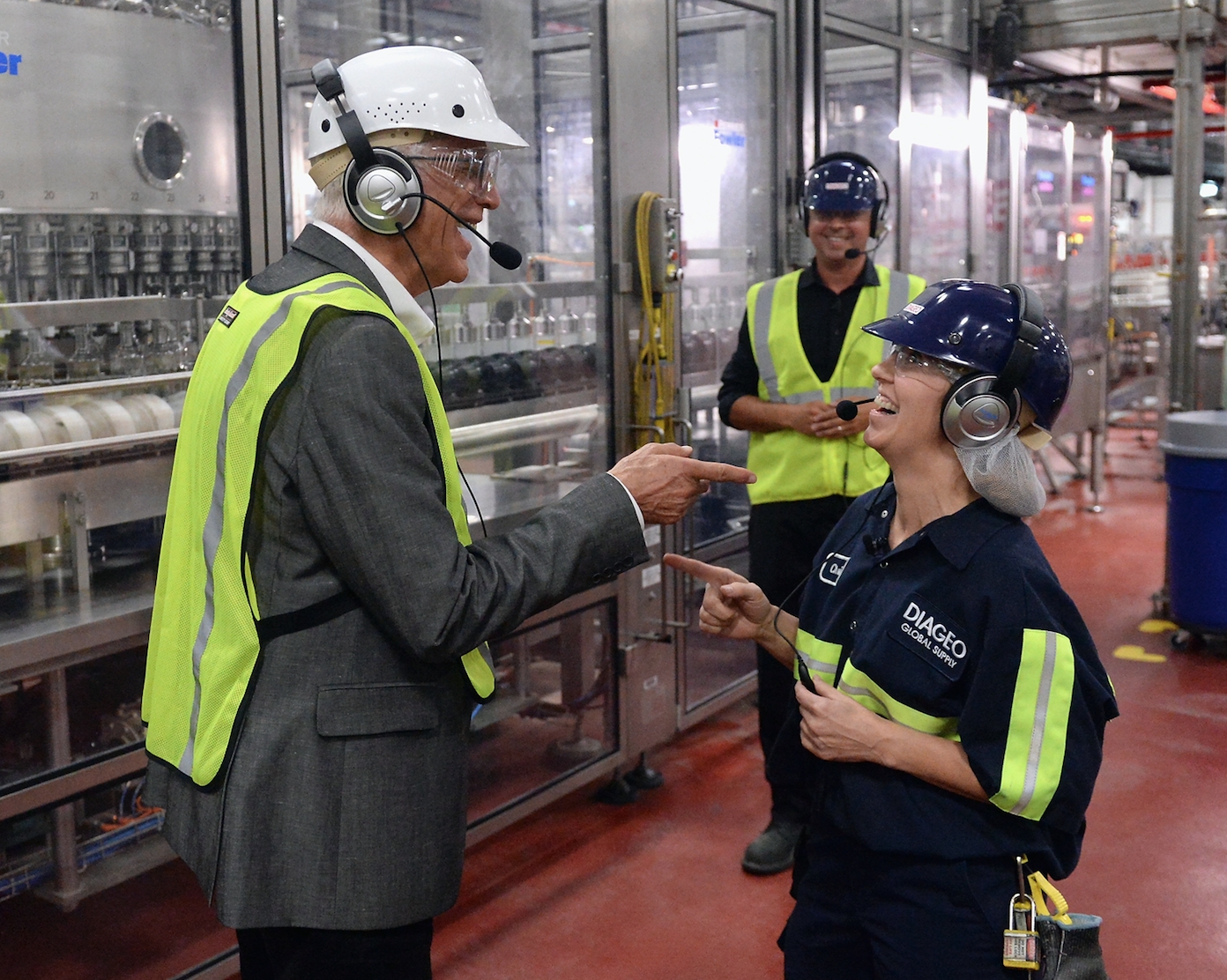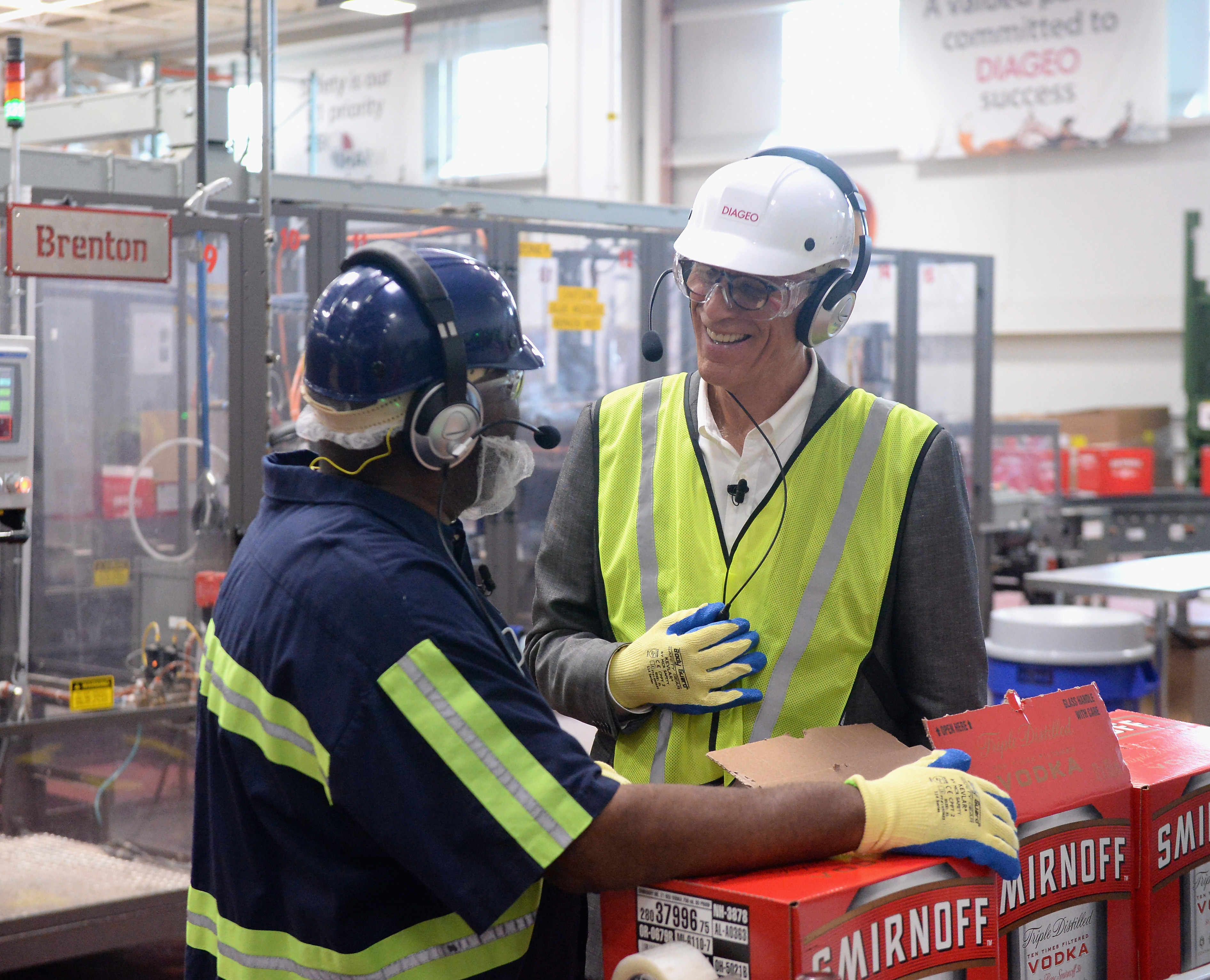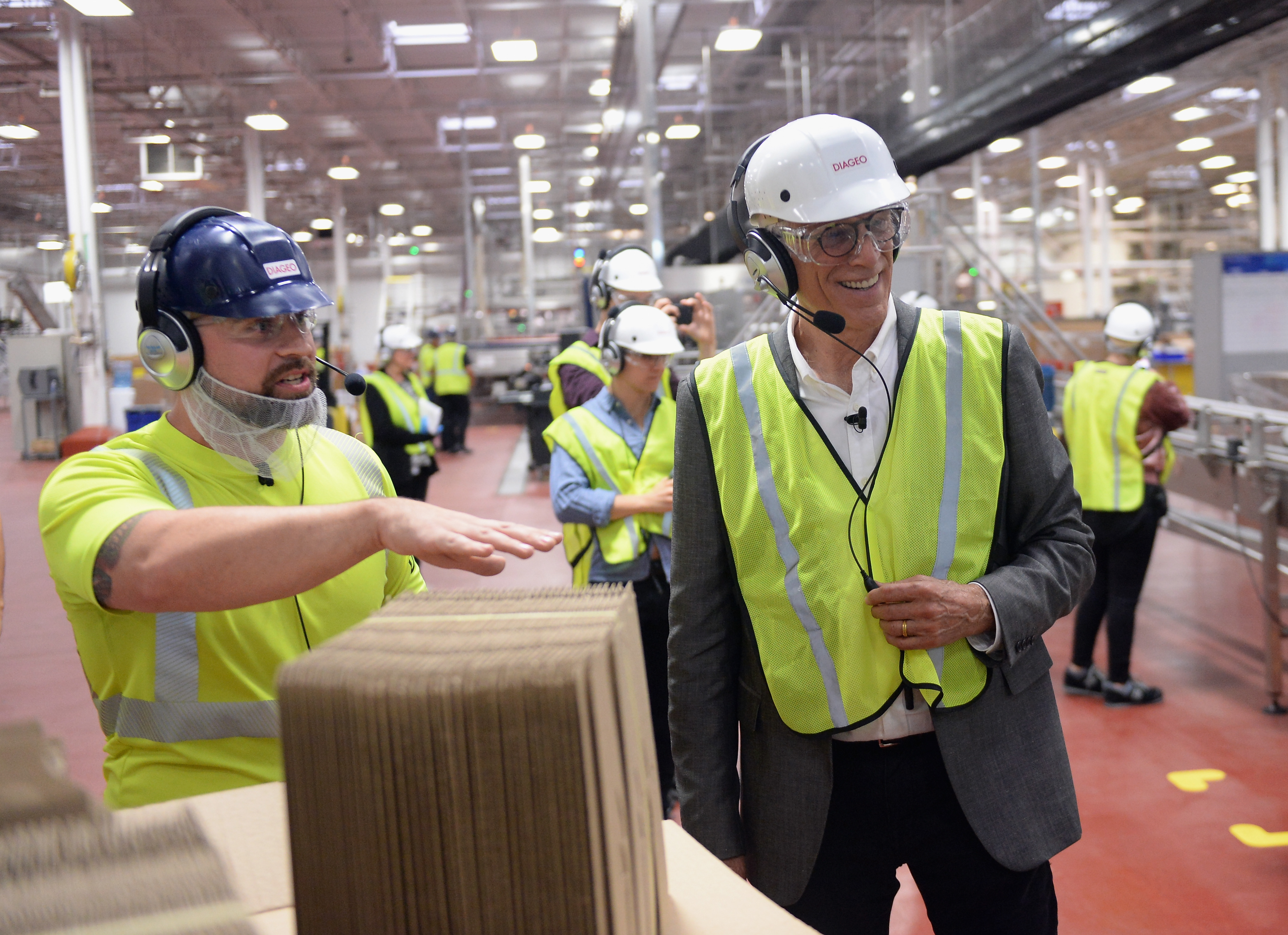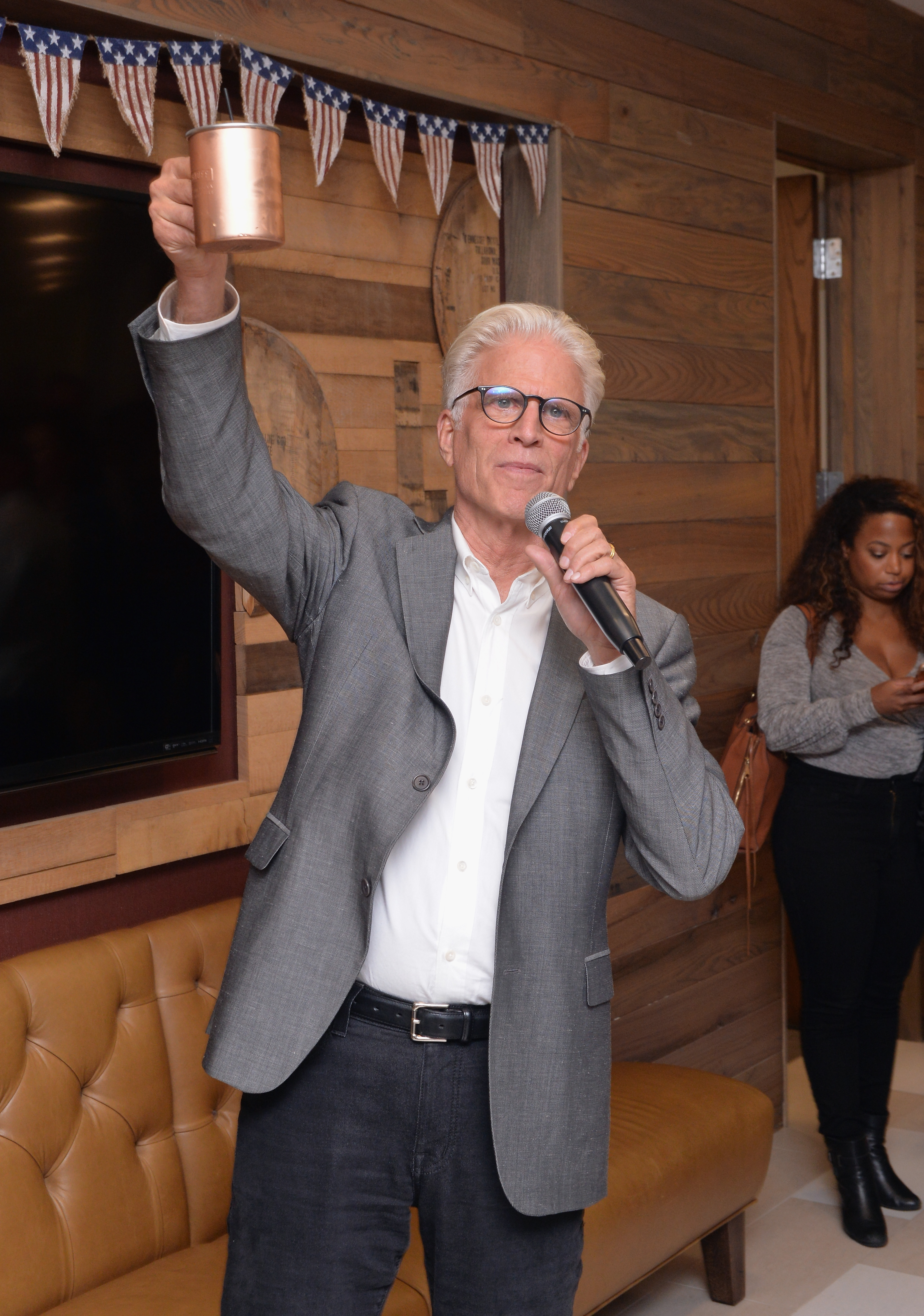
“Okay, what is that?” Ted Danson asks. In front of me sits a purple drink with a triumphant rosemary stalk chimney. I take a sip. “I’m not sure.” We’re in a swanky bar that was built in the corner of the offices in the Diageo facility located in Plainfield, Illinois. The vested bartender preparing the ingredients for the company’s National Vodka Day after-party explains that it’s Smirnoff No. 21 vodka, ruby port, fresh lemon juice, rosemary, simple syrup, and activated charcoal.
Danson turns, astonished, to the bartender. “You’re the real deal, aren’t you?”
The beloved actor — who, lest we forget, made his name playing a bartender — had just finished touring the massive distillery with a collection of food bloggers, and now we were sitting down for a relaxing drink. As the spokesman for Smirnoff, one of the many liquors that are produced in the unassuming plant, he was brought out to one of the sleepiest towns in the midwest to see how the booze is finished while meeting some of the workers. As a resident of the suburbs of Chicago, I was completely unaware that I neighbored the plant. It doesn’t really stand out or demand attention. It’s a grey, square box of a building that I’ve driven past dozens of times; never realizing that a never-ending supply of Bulleit whiskey, Captain Morgan’s rum, and Smirnoff is finished and bottled inside.
Danson couldn’t have been more smitten with his peek inside the never-ending aluminum guts of the company he pitches vodka for.
“Think about the engineering, the gizmos that allow so many bottles to have liquid put in, capped then shot out onto a truck, efficiently,” he tells me with a wide-eyed smile.
As we chat, I realize that the star of Cheers, Becker, Bored to Death, Curb Your Enthusiasm, and The Good Place appreciates few things more than a well-made product. He also understands the life of a factory worker — he once lived the life at a canning factory, well before he was an Emmy-winning comedy god.
“I worked at the Continental Can Company,” he says. “It was like hell, I lasted a month and a half. I was going to school at Carnegie-Mellon University and I worked from eleven at night until seven in the morning because I figured, ‘What the hell.‘” Danson exhales. “It was nightmarish and depressing. As you drive at 10:30 at night and you’re friends are going out then you come home and you’re a little energized but everyone’s asleep. And the cannery was surrounded by steel mills, so you go outside at 3 am for a little break and it was like you’re in Dante’s hell. Flaming, red glows everywhere.”
He makes mushroom cloud motions with his hands.

Danson’s enthusiasm for the facility was infectious to the point of bogarting the tour. Before any of the journalists could slip a question in, he spoke up, wondering about the charcoal that turns the corn-based, raw alcohol into something smooth and tasteless. The tour guide happily obliged Danson awestruck questions, before we moved into the bottling section of the plant. As we walked, I noticed that most of the food bloggers put away their notes.
This was Danson’s question and answer time now. We were just along for the ride.
As we ventured deeper into the adult Willy Wonka factory, Danson shouted “Wow!” into his walkie-talkie then stopped for a moment to take it all in. “Who engineered this?” He asked the tour guide, who doesn’t have an answer for this macro-sized question.
A second later, the actor walked to a wide-open space as if he needs a cinematic moment to appreciate the twists and turns of the conveyor belts and bottles moving efficiently along the line. His quiet whisper of “This is incredible” over his headset was nearly drowned out by the whirring machinery. This is the man I met: Utterly enthralled by the operation surrounding him. It was inspiring to see.
As the guide tried to usher us along, Danson walked up to workers, looked them in the eye and asked them maybe too many questions. Beyond, at least, what is required by any normal meet and greet. Along the way, he acted as a sort of celebrity quality control — tasting vodka in its various stages. If his enthusiasm was a performance, it’s one worthy of the man himself. But I can’t help believing that Danson was genuinely interested in the work.
Later, as I sip my fancy cocktail, I ask Danson what impressed him so much.
“I thought it was clever,” he says. “Everyone knew everyone’s position on the line, so they work a week here, a week there. You’re never bored, constantly working a different station. That’s smart. It’s not repetitive. At the cannery, I had been there with people who worked there before World War 2. They went off and fought, then came back. So they were there from high school on except for fighting and you had to just respect that. It’s moving.”
There’s a consistent theme of Danson’s near-fawning over these blue collared workers as they hustle packaging, or observe bottling lines — the pride that this damn fine vodka is made in the United States and that it’s affordable is of utmost importance to Danson. Smirnoff PR made damn sure I knew that the No. 21 won double gold at the San Francisco Spirits Festival, but the brand’s baseline vodka is one of the nation’s most beloved mixers — reliable. Appreciated. It’s not sexy, but the production of it is something worth appreciating.

The constant specter of being around a pitchman, getting paid to do a job isn’t lost on me. Maybe I’m cynical, but I poke and prod at Danson’s enthusiasm as we contemplate my impressive drink.
“I was excited to visit a factory to see how things are made,” he said. “I work in a workplace where I’m very lucky, where people are really happy to be there. It’s a good show, good writing. They know they’re part of something good and have a sense of gratitude that they’re doing something good. I walked into that plant and in the first five minutes and I could tell it had the same quality. They knew they were making something good and that’s a lovely thing to see.”
Moving on to a second cocktail, I asked him if he was as appreciative and generally decent on-set as he is meeting the salt of the earth Diageo workers.
“It’s the contact with people that makes you want to go to work.” He looks at his hands for a moment before he quietly explains further. “I grew up in Arizona with a father who’s an archeologist. I grew up simple. I don’t know. I love people. I love going to work. At my job, they’re the best artists, the best painters, the best electricians, and carpenters. It’s an amazing thing that gets put together, like a little army. I still feel like I’m part of this gypsy band that’s exotic and exciting, just like downstairs, a little army. It’s something to be proud of.”
As appreciative as he is about the Smirnoff product, it wasn’t just the money or the vodka itself that attracted Danson to being a pitchman. He was attracted to the writing first and foremost.
“I tend to back into life going ‘Oh wow look at that!’ But a company that’s making something so good, being so confident and relaxed to use humor to sell something says a lot about them. It’s affordable, we’re proud of it and we have fun. I knew something was up by the tenor of the scripts. When I said ‘yes’ to making these videos, I knew nothing, really. I was saying things like ‘award-winning’ and ‘best-selling’ so coming here and really seeing, wow this is the best vodka in the last twenty years, that’s cool.”
Vodka, a paradox of alcohol in that it’s tasteless and odorless isn’t lost on Danson. “It’s counterintuitive that you would put this much work into making a beverage so you can’t taste it or smell it, but then you realize it’s an amazing beverage to mix. It’s smooth and powerful. I had no idea about the process — it’s the filtration that makes it a quality product.”
After his day with media is done and filming is wrapped, the handshakes come and don’t stop. Danson seems tired, wiping his eyes with his long fingers, but still, he greets everyone who comes within his line of sight with an electric energy which he seems to summon at will. Eventually, once the pictures and handshakes finally end, he makes his way to a smartly-dressed man.
“Did we do it?” Danson asks. “We got it!” The man replies. Danson stops for a beat, then asks again: “No, for real. Did we do it? I had a great time and these are good people,” The man nods his head, then Ted reaches out to the man’s Moscow Mule.
“Let me see that,” he says.
Danson places the copper mug in his fingers, balancing the drink without letting it touch his palms. He puts it up to his nose and smells it. “Can I have one of these?” The suits start buzzing, and seconds later Danson receives his own copper mug, sips, then raises it in the air. “This is delicious!”







